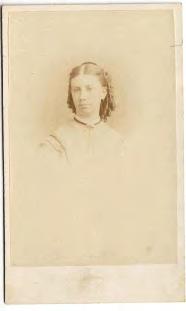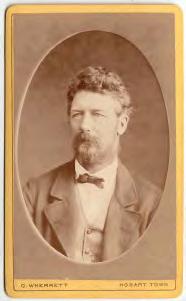Identity area
Reference code
Title
Date(s)
- 1801-1883 (Creation)
Level of description
Series
Extent and medium
Context area
Name of creator
Biographical history
Francis Cotton (1801-1883) arrived in Van Diemen's Land in 1828 with his wife Anna Maria (1800-1882 nee Tilney), five children and his friend Dr. George Fordyce Story (1800-1885). After working as a builder for six months he settled at Great Swanport on the East Coast, naming his property Kelvedon after Anna Maria's birthplace in Essex, U.K.
Francis Cotton was born in Shoreditch, London, in 1801, son of Thomas and Mary Cotton. He was brought up as a Quaker (member of the Society of Friends) and educated at Ackworth Friends School. He was then apprenticed to a builder as a carpenter and, as his master, John Farrar, was a citizen of London and member of a City of London Livery Company, the Drapers Company, he was entitled, after completing his apprenticeship, to join the Drapers Company and be admitted a citizen, or "freeman" of the City of London and his certificate of admission is dated 10 February 1825.
In 1820 Francis Cotton married Anna Maria Tilney, daughter of John Shelton Tilney of Chelmsford, shopkeeper, and his wife Susannah. Francis and Anna Maria were both Quakers but were both disowned by their Meetings for marrying without the approval of the Meetings and they were only reinstated some years later, after the Quaker missionaries James Backhouse and George Washington Walker visited Tasmania. They both, however, lived according to Quaker principles and Francis later made several visits "of concern" to Quakers in New South Wales, South Australia and Victoria.
The family's first home on the East Coast was a sod hut at Waterloo Point (Swansea), but this burnt down with all the stores and equipment they had brought from England. A temporary cottage was then built on the property and was extended over the years as the family increased. The land was comparatively poor and required hard work to develop and was several times raided by aborigines. However, Francis prospered, developing fine fleeces for export to England, supplying meat and wheat to Government convict and military stations and later trading wattle bark and apples. Further land was acquired for the sons, including the Grange and Earlham properties. One of the younger sons, Edward Octavius, helped to work Kelvedon and eventually inherited it.
Nine more children were born at Swanport, fourteen altogether including two daughters who died soon after birth. Most of the sons remained in Tasmania, married and settled on property of their own. Son Tilney (1836-1914), however, went to South Australia, where the climate suited his chest better, settled at Streaky Bay and married Ann Allen in 1860. Son James Backhouse (1834-1906) did not marry but remained at Kelvedon until he accompanied Hannah Hall on missionary journeys and in 1882 returned with her to Canada and the USA. Two sons, George and Thomas, slightly shocked their mother by marrying Catholic servants of the family. George, who for a time served as a police officer, and his wife Margaret (Connell) later settled in the north-east. Thomas who married Bridget Burke in 1857 remained on the East coast at Grongar Hill and his mother came to accept that "there is much that is good about Bridget" who died in 1868 leaving five young children. Francis Cotton jr. of the Grange committed suicide in May 1872 One of the daughters, Mary, married William May of South Australia and lived near Adelaide until they came to settle in Tasmania.
The eldest daughter, Anna Maria (1823-1856, called Maria) married in 1842 Joseph Benson Mather, Clerk of the Hobart Meeting of Friends and a draper. Letters from the Cotton family to J.B. Mather were given to Frances Cotton by his grandchildren (Misses E.J . AND M.F. Robey) and these have also been deposited (ref.DX20). Anna Maria's letters from 1837 gave J.B. Mather many requests for shopping for supplies of food, clothing household goods and furniture etc. for her large family. Cloth for the children's clothes needed to be hard wearing and also dark coloured, to spare washing - in 1839 she was putting "all the girls and boys from George down to little Teddy into tartan with the intention of sparing washing the coming winter". Her letters give a lively picture of the life of a pioneer settler family. Francis' letters, from 1862, also include requests for household supplies and also business commissions relating to the sale of farm produce and include information on the farm work, business and trade, and local affairs and also Quaker matters. (See Frances Cotton, Kettle on the Hob: a family in Van Diemen's Land 1825 - 1885 (1986).
Dr George Fordyce Story (1800-1885), Francis Cotton's friend, settled with them and lived with the family at Kelvedon, acting as medical practitioner to the district and to the family. He was a keen botanist, member of the Royal Society of Tasmania and for a short time its secretary and supervisor of the Gardens. He collected specimens for and exchanged correspondence with Ferdinand van Mueller of the Melbourne Botanic gardens. Dr Story also made some mission journeys for the Society of Friends in Tasmania and the mainland. His papers have also been deposited (ref: C7) .
Immediate source of acquisition or transfer
Depositied in the University of Tasmania Archives in 1987 by E. Frances Cotton
Content and structure area
Scope and content
Photographs of the Cotton family and friends also prints and drawing collected by them
Appraisal, destruction and scheduling
Accruals
System of arrangement
Conditions of access and use area
Conditions governing access
May be consulted for research
Conditions governing reproduction
This material is made available for personal research and study purposes under the University of Tasmania Standard Copyright Licence. For any further use permission should be obtained from the copyright owners. For assistance please contact Special.Collections@utas.edu.au
When reusing this material, please cite the reference number and provide the following acknowledgement:
“Courtesy of the UTAS Library Special & Rare Collections”



